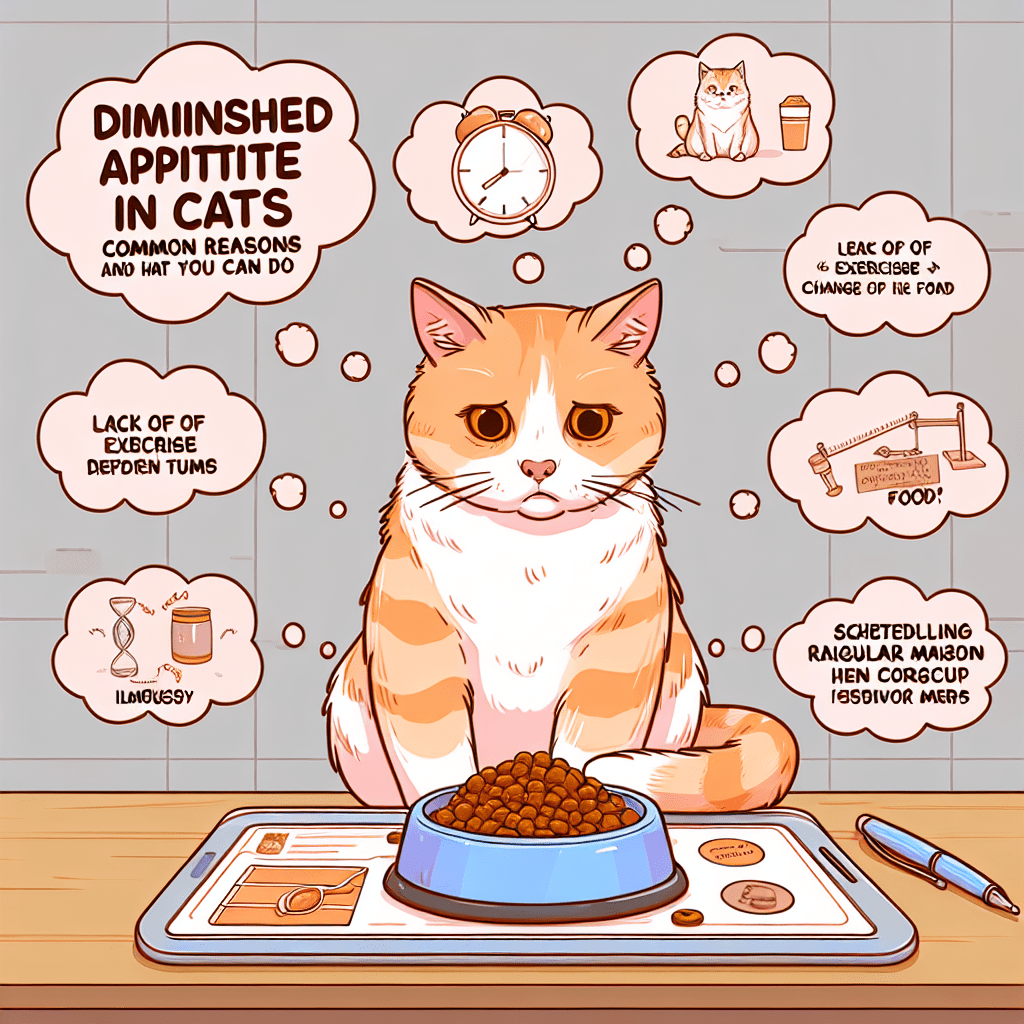Diminished Appetite in Cats: Common Reasons and What You Can Do
Diminished appetite in cats can be a troubling issue for any pet owner, often signaling underlying health problems or shifts in their environment. Understanding the reasons why your feline friend might be eating less is essential in providing the best care possible. While the thought of your cat refusing food can be concerning, there are several common reasons and actionable solutions to explore.
Overview of Diminished Appetite in Cats
Diminished appetite, or anorexia, in cats refers to a noticeable decrease in food consumption. Unlike a temporary disinterest in food, a sustained lack of appetite can indicate potential health issues. Factors affecting feeding can range from physical illness and dental problems to behavioral issues like stress. Recognizing these signs early can lead to prompt care and recovery.
Why Cats Lose Their Appetite
Several medical and environmental factors can contribute to a cat’s diminished appetite. Here are some of the most common reasons:
- Physical Illness: Conditions such as kidney disease, liver problems, and infections can significantly impact your cat’s desire to eat.
- Dental Issues: Oral pain from periodontal disease or broken teeth makes eating uncomfortable.
- Stress: Changes in routine, new pets, or even rearranging furniture can disturb a cat’s sense of security.
- Medication Side Effects: Some medications may lessen appetite or cause nausea.
- Food Preferences: Cats can be picky, and if they don’t like a new food, they may refuse it altogether.
- Aging: Older cats often have reduced metabolic rates and may require less food.
- Dietary Changes: Switching food abruptly can lead to upset stomachs and loss of appetite.
- Lack of exercise: Activity can encourage eating, while a sedentary lifestyle might lead to disinterest in meals.
- Environmental Changes: Moving to a new home or introducing a new person can lead to anxiety.
- Underlying Diseases: Conditions like hyperthyroidism and diabetes are also known to affect appetite.
Who Is Affected by Diminished Appetite
All cats can experience reduced appetite at some point in their lives. Kittens may not eat as much when adjusting to new diets, while senior cats face increased risks of illness. Breed, age, and overall personality play a significant role in how each cat experiences nourishment fluctuations. Understanding individual behaviors can assist in identifying when something is wrong.
Who Will Use This Information
Cat owners, veterinarians, and animal caregivers can benefit from knowledge about decreased appetite in cats. This understanding aids in recognizing potential health risks and advocating for adequate veterinary care when necessary. By being vigilant, you can help ensure your feline friend’s health and happiness.
What To Do When Your Cat Stops Eating
Addressing diminished appetite involves several proactive steps. Here are some suggestions:
- Visit the Veterinarian: A thorough health examination can rule out medical issues.
- Observe Behavior: Take note of any changes in your cat’s behavior, weight, and eating patterns.
- Check for Dental Problems: Look for signs of pain or discomfort in your cat’s mouth.
- Provide Comfort: Create a calm feeding environment, free from loud noises or disturbances.
- Try Different Foods: Experiment with wet food or enticing flavors to stimulate appetite.
- Warm the Food: Slightly warming food can enhance aroma and encourage eating.
- Maintain Routine: Stick to established feeding times to foster a sense of security.
- Ensure Hydration: Make sure your cat stays hydrated, as dehydration can occur quickly.
- Consider Stressors: Identify and mitigate stressors like new pets or disruptions in routine.
- Use Interactive Feeding: Introducing toys or puzzles can make eating more stimulating.
Pros and Cons of Addressing Diminished Appetite
Pros
- Early detection of health issues can lead to better outcomes.
- Improved feeding practices can enhance bond and interaction.
- Knowledge can change behavior and feedings positively.
Cons
- Medical treatments can be costly depending on the diagnosis.
- Some changes may take time to implement before you see results.
- Experimenting with new foods may lead to further disinterest.
Similar Conditions in Cats
Diminished appetite can be related to various other conditions that might affect a cat’s eating habits:
- Nausea: Often seen in cats with gastrointestinal disturbances.
- Hyperthyroidism: This common condition in older cats can lead to increased metabolic rates and change foot consumption.
- Diabetes: Alterations in appetite are common as insulin levels fluctuate.
- Food Allergies: Certain ingredients can trigger gastrointestinal distress.
- Behavioral Issues: Boredom or fear can also lead to changes in eating patterns.
Symptoms to Observe
Keep a keen eye out for these additional symptoms that may indicate more severe issues:
- Weight loss
- Lethargy
- Vomiting
- Diarrhea
- Excessive grooming or hiding
- Changes in litter box habits
- Vocalizations or mood changes
FAQs
1. What if my cat refuses to eat for more than a day?
If your cat has not eaten for over 24 hours, consult your veterinarian promptly. Prolonged refusal can lead to serious health risks.
2. Can stress affect my cat’s appetite?
Yes, stress from environmental changes or loud noises can impact a cat’s willingness to eat.
3. Should I offer wet or dry food to encourage my cat to eat?
Experimenting with both can help. Many cats prefer wet food, which is more aromatic.
4. What are the signs of dental problems in cats?
Look for swollen gums, excessive drooling, and reluctance to eat. These can all indicate dental issues.
5. How can I prevent my cat from losing appetite again?
Maintain a consistent routine, monitor food changes, and create a calm home environment to reduce stressors.
Disclaimer: As an Amazon Associate, I earn from qualifying purchases. I may earn a commission from qualifying purchases as an affiliate. Please note that I only recommend products I believe will provide value to my readers.

